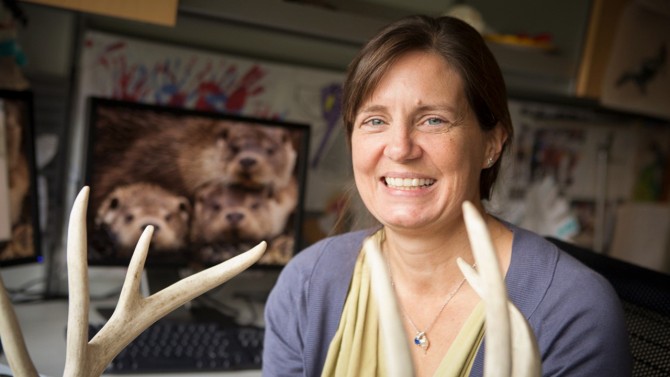At a critical time for the future of life on Earth, the College of Veterinary Medicine has established the Cornell Wildlife Heath Center, which aims to catalyze multidisciplinary collaboration to address global wildlife health challenges.
The new center, which opened in 2017 as Wildlife Health Cornell, also will focus on immersing students in unique learning experiences, at home and abroad.
"The College of Veterinary Medicine is truly a global leader when it comes to wildlife health," said Dr. Steve Osofsky, D.V.M. '89, the Jay Hyman Professor of Wildlife Health & Health Policy, who leads the center. Osofsky spearheaded the initiative soon after joining the faculty in 2016, following more than a decade at the Wildlife Conservation Society.
Dr. Elizabeth Bunting, senior extension associate in population medicine and diagnostic sciences.
"The college clearly recognizes that the health of wild animals is increasingly a societal responsibility," he said, "as human-induced pressures on remaining habitats and species continue to mount."
Lorin Warnick, D.V.M., Ph.D. '94, the Austin O. Hooey Dean of Veterinary Medicine, said he hopes the new center will "increase the visibility and success of our work with wildlife in New York and around the world." Warnick noted the success of other CVM centers, including the Feline Health Center and the Center for Veterinary Business and Entrepreneurship.
"(These centers) allow us to have a positive impact on issues of great relevance to veterinary medicine, and also of vital importance to broader society," Warnick said. "The Wildlife Health Center will provide more synergy among our many wildlife health activities, improve student opportunities and help promote a multidisciplinary approach to addressing wildlife research and conservation challenges."
The center unites wildlife health professionals and others from across the college and beyond who are involved in wildlife health and conservation, with an emphasis on moving science into policy and action. Affiliated faculty are experts in fields including wildlife diagnostic testing, pathology, epidemiology, ecology, genomics, clinical care, assisted reproduction technologies and international development and policy.
One priority will be addressing health threats in key umbrella species, such as wild carnivores. Dr. Martin Gilbert, a senior research associate in population medicine and diagnostic sciences, tracks canine distemper virus in wild tigers and other big cats in Asia; the virus could push already threatened species to extinction. Another priority is reducing the spread of diseases between domestic animals and wildlife.
In partnership with the New York State Department of Environmental Conservation, members of the Cornell Wildlife Health Lab work to address health threats to the state's wildlife, from bald eagles to moose to reptiles and amphibians.
"We are seeing more diseases now, possibly because we have a lot more stressors on wildlife than we've had before," says Dr. Elizabeth Bunting, senior extension associate in population medicine and diagnostic sciences.
The opening of the center comes at a time when human activities are severely threatening wildlife populations.
"But it's not all gloom and doom," Osofsky said. "If we're strategic and we work across disciplines, we can secure a future for wildlife and wild places. That's what the center is all about."
See a longer version of this story on the CVM website.
Patricia Waldron is a freelance writer for the College of Veterinary Medicine.








